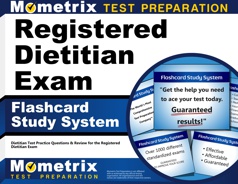The Commission of Dietetic Registration (CDR) administers the Registered Dietitian exam, which evaluates a dietitian’s ability to perform at an entry-level and allows those who pass to become certified.
Click “Start Test” above to take a free Registered Dietitian practice test!
Registered Dietitian Exam Eligibility
Effective January 1, 2024, the minimum degree requirement for eligibility to take the registration examination for dietitians has changed from a bachelor’s degree to a graduate degree.
Candidates can meet the education requirements in one of five ways:
- Hold a graduate degree
- Complete an Accreditation Council for Education in Nutrition and Dietetics (ACEND) accredited didactic program in dietetics and complete an internship of at least 1,200 practice hours.
Option 2: Coordinated Program (CP)
- Hold a graduate degree
- Complete the ACEND coordinated program
Option 3: Graduate Program
- Complete an ACEND-accredited dietitian nutritionist program (1,000 hours minimum)
Option 4: DPD ISPP
- Hold a graduate degree
- Complete the ACEND didactic program in dietetics (DPD)
- Complete ACEND DPD supervised practice requirements (1,200 hours minimum)
- Be unable to match with a DI
Option 5: Doctorate ISPP
- Hold a doctorate degree
- Complete ACEND doctorate level supervised practice requirements (1,200 hours minimum)
Registered Dietitian Exam Outline
The number of questions on this exam depends on how well you answer them. You will be given a minimum of 125 questions to answer, and if you fail to answer them within the 2.5-hour time limit, you will receive a failing score. If you answer the questions within the time limit, you will be given up to 20 more questions to answer until the time runs out.
The questions are split into four domains:
I. Principles of Dietetics (21%)
The questions in this domain assess your knowledge of various aspects of dietetic principles, such as food science, communication methods, and research. Here are the specific topics that are covered:
Food, Nutrition and Supporting Sciences
- Food science
- Food composition
- Normal nutrition principles
- Human anatomy, physiology, biochemistry, and microbiology
- Social determinants of health
Education, Communication, and Technology
- Education plan components
- Education theories
- Implementation
- Evaluation of educational outcomes
- Client information
- Healthcare and nutrition informatics systems/technologies
- Public policy legislation and advocacy
Research Applications
- Research types
- Research processes
- Making decisions based on data collection, analysis, interpretation, and outcomes
- Presentation of research data
- Reporting research findings
- Grading systems
II. Nutrition Care for Individuals and Groups (45%)
The questions in this domain assess your knowledge of various aspects of nutrition care, such as nutrition screening, diagnosing nutrition problems, and developing related programs and services. Here are the specific topics that are covered:
Screening and Assessment
- Nutrition screening
- Assessment of individual nutrition
- Diagnosing nutrition problems
- Assessing community needs
Diagnosis
- Relationship between nutrition diagnoses and medical diagnoses
- Nutrition diagnosis tools and data sources
- Diagnosing nutrition problems
- Etiologies
- Signs and symptoms
- Documentation
Planning and Intervention
- Health promotion and disease prevention
- Medical nutrition therapy
- Promoting and implementing national dietary guidance
- Program and service development
Monitoring and Evaluation
- Monitoring progress and updating previous care
- Using evidence-based guides to measure outcome indicators
- Evaluating effectiveness and outcomes of nutrition interventions
- Outcome measurement systems and quality improvement
- Determining transition and continuation of care
III. Management of Food and Nutrition Programs and Services (21%)
The questions in this domain assess your knowledge of various aspects of food management and nutrition programs. Here are the specific topics that are covered:
Functions of Management
- Functions
- Management characteristics
Human Resource Management
- Employment laws and regulations
- Employment standards
- Employment processes
Marketing and Public Relations
- Marketing analysis
- Pricing
- Public relations
- Marketing mix principles
Quality Management and Regulatory Compliance
- Regulatory guidelines
- Process, implementation, and evaluation
- Scope of practice
- Professional performance standards
- Code of ethics
IV. Foodservice Systems (13%)
The questions in this domain assess your knowledge of various aspects of foodservice systems. Here are the specific topics that are covered:
Menu Development
- Menus
- Menu development
Procurement, Production, Distribution, and Service
- Procurement, receiving, and inventory management
- Principles of quantity food preparation and processing
- Food production control procedures
- Marketing mix principles
- Production systems
- Distribution and service
Sanitation and Safety
- Sanitation
- Food safety
- Employee safety
Equipment and Facility Planning
- Facility layout
- Equipment
- Sustainability
- Emergency preparedness
- Contingency planning
Check out Mometrix's Registered Dietitian Study Guide
Get practice questions, video tutorials, and detailed study lessons
Get Your Study Guide
Registered Dietitian Exam Registration
To register for the exam, you must create a Pearson VUE account online and follow the registration instructions. This process includes sending in all necessary documentation, proof of eligibility, and the $200 examination fee.
Once you have been approved, you will be sent an Authorization to Test (ATT) via email. You will then need to schedule a time and day for your exam.
Test Day
You should arrive at the testing center 15-30 minutes prior to your scheduled exam time. Once you arrive, you will be asked to present a form of valid, government-issued photo ID. If you arrive late or your ID is invalid, you will not be permitted to take the exam that day. During the check-in process, you will have your palm scanned using biometric technology as a safe form of identification. If you wear glasses, you will be asked to remove them for inspection.
Once the check-in process is complete, you will be asked to store all personal items (cell phone, bags, hats, notes, etc.) in a small locker outside the testing room. You will also be advised that studying for the exam is not allowed while you are in the testing center.
Once the exam begins, you will be given a small erasable whiteboard, and a simple pop-up calculator will be available on the computer screen if needed. If you wish to take any breaks, the timer will continue on and you will lose valuable time.
When you finish the exam, your score will appear on the computer screen, and you will be given a physical copy of your score report before you leave the testing center.
How the Registered Dietitian Exam is Scored
This exam is scored on a scale of 1-50. To pass, you must achieve a scaled score of at least 25. Because the exam is computer-adaptive, the number of questions it takes to pass the exam will vary from person to person.
Here’s a look at how the computer-adaptive system works:
The first question is judged to be of medium difficulty, and depending on your performance, the next question may be easier or harder. If you do well on the first question, the second question will be harder; conversely, if you do poorly on the first question, the second question will be easy.
Check out Mometrix's Registered Dietitian Flashcards
Get complex subjects broken down into easily understandable concepts
Get Your Flashcards
How to Study for the Registered Dietitian Exam
How to Study Effectively
Your success on Registered Dietitian test day depends not only on how many hours you put into preparing but also on whether you prepared the right way. It’s good to check along the way to see whether your studying is paying off. One of the most effective ways to do this is by taking Registered Dietitian practice tests to evaluate your progress. Practice tests are useful because they show exactly where you need to improve. Every time you take a free Registered Dietitian exam practice test, pay special attention to these three groups of questions:
- The questions you got wrong
- The ones you had to guess on, even if you guessed right
- The ones you found difficult or slow to work through
This will show you exactly what your weak areas are and where you need to devote more study time. Ask yourself why each of these questions gave you trouble. Was it because you didn’t understand the material? Was it because you didn’t remember the vocabulary? Do you need more repetitions on this type of question to build speed and confidence? Dig into those questions and figure out how you can strengthen your weak areas as you go back to review the material.
Answer Explanations
Additionally, many Registered Dietitian practice tests have a section explaining the answer choices. It can be tempting to read the explanation and think that you now have a good understanding of the concept. However, an explanation likely only covers part of the question’s broader context. Even if the explanation makes sense, go back and investigate every concept related to the question until you’re positive you have a thorough understanding.
Comprehend Each Topic
As you go along, keep in mind that the Registered Dietitian practice test is just that: practice. Memorizing these questions and answers will not be very helpful on the actual test because it is unlikely to have any of the same exact questions. If you only know the right answers to the sample questions, you won’t be prepared for the real thing. Study the concepts until you understand them fully, and then you’ll be able to answer any question that shows up on the test.
Strategy for Registered Dietitian Practice
When you’re ready to start taking practice tests, follow this strategy:
- Remove Limitations. Take the first test with no time constraints and with your notes and Registered Dietitian study guide handy. Take your time and focus on applying the strategies you’ve learned.
- Time Yourself. Take the second practice test “open book” as well, but set a timer and practice pacing yourself to finish in time.
- Simulate Test Day. Take any other practice tests as if it were test day. Set a timer and put away your study materials. Sit at a table or desk in a quiet room, imagine yourself at the testing center, and answer questions as quickly and accurately as possible.
- Keep Practicing. Keep taking practice tests on a regular basis until you run out of practice tests or it’s time for the actual test. Your mind will be ready for the schedule and stress of test day, and you’ll be able to focus on recalling the material you’ve learned.
FAQs
Q
Can I use a calculator on the Registered Dietitian exam?
A
Yes, but you should not bring your own calculator with you to the testing center. A pop-up calculator will be available on the computer you take the exam on.
Q
How many questions are on the Registered Dietitian exam?
A
The number of questions on the exam depends on your ability to answer the minimum number of questions within the time limit. If you answer the minimum 125 questions within the time limit, you will be given up to 20 more questions to answer (for a maximum total of 145 questions).
Q
How long is the Registered Dietitian exam?
A
The time limit for this exam is 2.5 hours.
Q
What is the passing score for the Registered Dietitian exam?
A
To pass this exam, you must achieve a scaled score of 25.
Q
How much does the Registered Dietitian exam cost?
A
The examination fee for this exam is $200.


